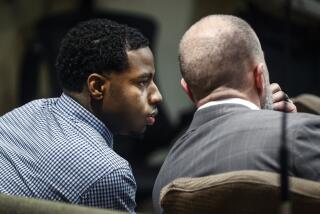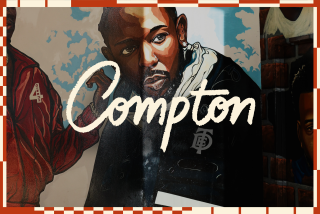Gang killer challenges state drive-by shooting law
- Share via
A Compton gang member is challenging California’s drive-by shooting statute in hopes of overturning a life sentence for a triple-murder conviction.
Michael Reed Dorrough was sentenced Oct. 6, 1999, to three life terms without parole, plus 49 years, for his role in an afternoon shootout at a Compton carwash that left three men dead, including his friend Orlando Anderson--the lead suspect in the slaying of rapper Tupac Shakur.
Dorrough’s attorney has petitioned the California Supreme Court, contending that his client has been unjustly imprisoned under a law designed to punish gang murders orchestrated from moving vehicles. Under a “special circumstance” clause of the statute, a jury need not determine whether a defendant killed deliberately or with premeditation to return a first-degree murder verdict--only that a firearm was discharged from a motor vehicle with the intent to kill.
But Dorrough, his attorney says, did not arrive at the carwash intending to harm anyone. He was unarmed, the lawyer says, sitting in the passenger seat of Anderson’s black Blazer, which was parked in the carwash driveway when the fight broke out. Dorrough had nothing to do with the battle and only fought back after a rival gang member killed Anderson and wounded Dorrough, his attorney says.
“This was clearly a situation of self-defense. Not first-degree murder,” said Dorrough’s attorney, Robert Derham. “Some guy threatens Michael’s best friend with a gun and an altercation breaks out. Just because they happen to be sitting in a car, you can’t prosecute the case like it was a premeditated drive-by. That’s an abuse of the law. It puts the jury in a straitjacket. It takes away their power to mete out a fair punishment.”
U.S. Deputy Atty. Gen. John Yang disagrees.
“This was a drive-by shooting within the meaning of the law,” said Yang, who is fighting the appeal for the government. “The vehicle was used as a staging ground for the commission of a shooting and then used for an escape.”
During the trial, prosecutors portrayed the shooting as an ambush, and a jury convicted Dorrough under the drive-by statute. Although an appellate court sustained the verdicts, Dorrough’s attorney still disputes the prosecution’s version of events.
The shootout took place about 3 p.m. on May 29, 1998, at Rob’s Car Wash at Alondra Boulevard and Oleander Avenue. Sparked by a dispute over a drug deal, the brief but intense gun battle scattered bystanders and left four men sprawled on the pavement, all of them gang members.
According to police, two of those who lost their lives, Michael Stone and his nephew Gerry Stone, were members of the Corner Pocket Crips gang from Compton. Anderson, like Dorrough, was a member of a different Compton group called the Southside Crips.
On the day of the incident, Anderson drove past the carwash, where at least three members of a rival gang had gathered.
Anderson pulled into the business and got into an argument about the unpaid drug debt with Gerry Stone, who witnesses say immediately brandished a weapon. Witnesses also say that Dorrough talked Stone into putting the gun away, but that Anderson pulled out his own gun and a battle ensued.
Anderson shot Gerry Stone before being slain himself in a hail of bullets. When Anderson dropped his gun, a wounded Dorrough recovered it and returned fire, killing Michael Stone, his lawyer said.
Dorrough then tried to escape by driving the vehicle from the passenger seat, but was so injured that he crashed it just down the block.
Anderson, who was pronounced dead moments after being taken to a hospital, had been named by police as a suspect in the 1996 Las Vegas slaying of Shakur--although there was never any direct evidence linking him to the crime.
Anderson had been pummeled by Shakur and a group of Death Row Records employees in the lobby of a Las Vegas hotel about three hours before the rapper was gunned down on the Strip.
Shakur’s mother filed a wrongful death lawsuit against Anderson, blaming him for her son’s unsolved slaying after police documents named him as a key suspect. Anderson vehemently denied the allegations in an interview with The Times about a year before he was gunned down.
More to Read
Sign up for Essential California
The most important California stories and recommendations in your inbox every morning.
You may occasionally receive promotional content from the Los Angeles Times.










